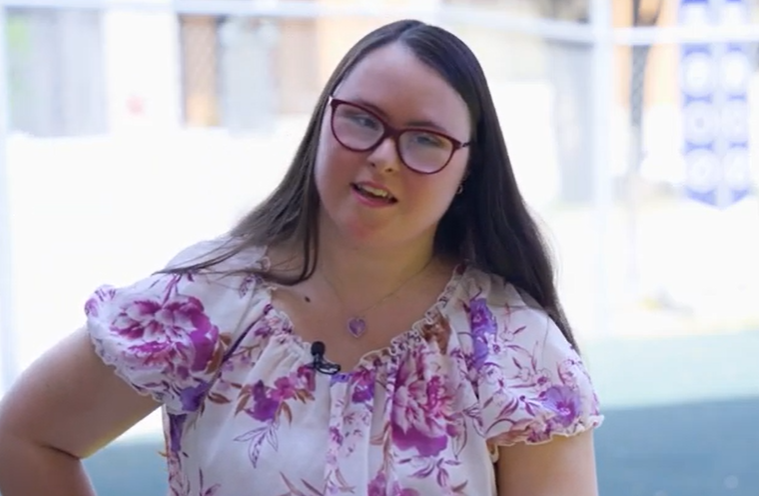May marks the start of Speech and Hearing Month, a time to celebrate the power of communication! Our amazing speech-language pathologists, audiologists and communicative disorders assistants have teamed up to address some frequently asked questions from caregivers and people with developmental disabilities. Keep reading to learn about building literacy skills, augmentative and alternative communication, and hearing health!
FAQ: Can people with developmental disabilities learn to read and write? Is this something we can improve?
Answer: Yes! People with disabilities may need specialized instruction or additional time to build literacy skills. Not everyone will progress at the same rate or develop as far, but even basic literacy skills can be life-changing. Being able to follow simple written directions, fill out personal information on forms, read labels, or send a text are essential life skills. Literacy skills make a huge difference in independent living, employment, and social connection.
FAQ: Should I speak more than one language with my child or only use English?
Answer: We recommend you speak the language you are most comfortable with so your child hears the best example of language possible. Rest assured, speaking more than one language will not cause a language delay. it’ll allow your child to interact with their extended family and community! If your child has a developmental delay or intellectual disability, they can still learn more than one language. It’s perfectly normal for all children learning multiple languages to switch languages frequently and to have one stronger language. When using more than one language at home, try to keep it consistent. You could have one parent speak one language to help your child differentiate their two (or more!) languages.
FAQ: What is AAC, and will it prevent an individual from using speech?
Answer: AAC stands for Augmentative and Alternative Communication, and it includes signs, picture symbols, speech-generating devices and written text and is commonly used by clinicians to give clients of all ages who have delays in speech and language development. The use of AAC will not prevent the use or development of verbal speech. In fact, we know from many research studies that when AAC is introduced, the AAC user either shows an increase in speech production or no change, and none of the studies showed a decrease in speech. Although the degree of gains in speech production varies across individuals, overall, using AAC encourages communication!
FAQ: I understand everything the person I’m caring for wants. We communicate in our own way. He points to things or goes to get what he wants on his own. Why would I use AAC?
Answer: Pointing to or showing objects is a great way to get your message across. We all use multiple ways to communicate every day. For instance, we may smile at a friend, nod our head to say yes, say “hello,” or send a text. Pointing to or showing objects can be part of a total communication approach, which supports all methods that a person may use to express themselves and understand others (sign, speech, gesture, pictures, etc.). However, if that’s the only way that someone is communicating, it can be limiting. It means that you can only communicate about things that are physically present in the immediate environment.
Using AAC is one way to expand communication beyond just the here and now. It gives you a way to talk about how you’re feeling, a school activity, tell a joke, ask someone for directions, and so much more! AAC also gives you a way to talk about action words (e.g. go, dance), describing words (e.g. happy, blue), or places (e.g. school, park) that can be almost impossible to express with objects. If your child is having a hard time being understood outside of the home, using AAC can be a tool to help them be better understood and connect with others.
FAQ: The person I’m caring for has a history of frequent ear infections. Could this affect her/his speech or language development?
Answer: This could affect speech and language. While there is no direct causal link between chronic ear infections and speech or language delay, individuals are generally thought to be more at risk for developing communication impairments with this medical history. It would be helpful to have an audiological exam to determine if there is a hearing impairment and closely monitor it.
FAQ: How often should someone get their hearing tested?
Answer: It depends on many factors. Everyone should get their hearing screened at birth through the Infant Hearing Program since early detection of hearing loss is key for successful intervention. Hearing is often checked when diagnosing problems related to tinnitus (ringing in the ears) and problems with keeping balance. It’s also typically checked during the initial diagnosis of autism and specific syndromes associated with a higher risk of hearing loss, such as Down Syndrome, Fragile X, and Treacher-Collins. If you have confirmed hearing loss, we recommend having your hearing checked at least once every two years for monitoring purposes. People with recent social behaviour changes, like increased social isolation or being less responsive to auditory stimuli, should also have their hearing checked.
FAQ: What happens during a hearing test?
Answer: There are various approaches based on the individual’s level of functioning and chronological age, but in general, the audiologist will record the softest level that the individual can hear across the frequency range. This is accomplished by either asking them to push a button when they hear a sound, play a game when they hear a sound, or teaching them to turn their head in response to a sound. There are also physiological tests that the audiologist can complete with the client to ensure the results are accurate.
FAQ: How much do hearing aids cost?
Answer: Hearing aids are often fully covered for clients at Surrey Place. One funding source is the Assistive Devices Program (ADP), which covers $500 for each hearing aid. For clients on the Ontario Disability Support Program, the remaining amount of the hearing aids are covered. Pediatric clients may also be eligible for funding through the Assistance for Children with Severe Disabilities (ACSD) program.
To find out if our services are right for you or your child, contact us at 1-833-575-5437 for children under 18, or 1-855-372-3858 for adults aged 18 or older.


